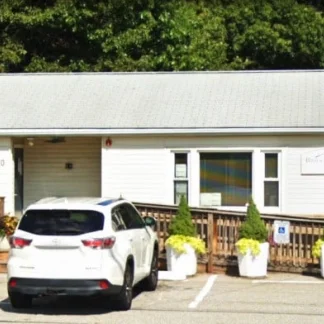AA - Alcoholics Anonymous - 23 de Nov
AA – Alcoholics Anonymous – 23 de Nov is a private rehab located in Providence, ...
Bridgemark Addiction Recovery Services, located in Warwick, Rhode Island, is a nonprofit addiction treatment facility that provides a safe and stable environment where recovery from alcohol and drugs can take place.
Bridgemark Addiction Recovery Services offers inpatient, outpatient, mental health therapy and transitional housing for adult males seeking to live a life of recovery.
Bridgemark’s residential treatment program is for adult males who need 24/7 support while beginning their recovery journey. This is the first stage of a four level recovery process. The stages of recovery include inpatient, outpatient, sober living, and aftercare. Inpatient treatment provides a medical and mental health approach to stabilization that allows for deeper healing to begin to take place. : Bridgemark’s outpatient programming is for adult men and women seeking rehab while also staying at home every night. Services include therapies, groups, and individual counseling. Bridgemark’s staff works with outpatient clients to assess their current stage of recovery, develop an individualized treatment plan and schedule a sequence of appointments for counseling.
Bridgemark offers transitional housing for males who need help maintaining their daily routines as they continue to live a substance free life. Participants are encouraged to maintain a connection with their family, work life, and other responsibilities while living in a safe, substance free environment with others recovering from drugs and alcohol.
Aftercare involves making a sustainable plan for recovery, including ongoing support so that continued abstinence can be achieved. This can include sober living arrangements like halfway houses, career counseling, and setting a patient up with community programs like Alcoholics Anonymous or Narcotics Anonymous. Bridgemark may assist with helping to locate the appropriate transitional housing, along with helping identify the proper continued mental health support.
Bridgemark offers assistance with smoking cessation for individuals who are ready to quit tobacco products. They combine nicotine replacement therapy with counseling.
Contact us for more information: (401) 781-2700

Connect with Bridgemark Recovery by calling their admissions team directly.
(401) 781-2700 Website Get DirectionsResearch clearly demonstrates that recovery is far more successful and sustainable when loved ones like family members participate in rehab and substance abuse treatment. Genetic factors may be at play when it comes to drug and alcohol addiction, as well as mental health issues. Family dynamics often play a critical role in addiction triggers, and if properly educated, family members can be a strong source of support when it comes to rehabilitation.
Group therapy is any therapeutic work that happens in a group (not one-on-one). There are a number of different group therapy modalities, including support groups, experiential therapy, psycho-education, and more. Group therapy involves treatment as well as processing interaction between group members.
In individual therapy, a patient meets one-on-one with a trained psychologist or counselor. Therapy is a pivotal part of effective substance abuse treatment, as it often covers root causes of addiction, including challenges faced by the patient in their social, family, and work/school life.
Life skills trainings involve all the skills a person must have in order to function successfully in the world. These include time management, career guidance, money management, and effective communication. Truly successful addiction recovery is based on the ability to not only live substance-free, but to thrive. Life skills teaches the practical necessities of functioning in society, which sets clients up for success in life, and therefore sobriety.
Group therapy is any therapeutic work that happens in a group (not one-on-one). There are a number of different group therapy modalities, including support groups, experiential therapy, psycho-education, and more. Group therapy involves treatment as well as processing interaction between group members.
In individual therapy, a patient meets one-on-one with a trained psychologist or counselor. Therapy is a pivotal part of effective substance abuse treatment, as it often covers root causes of addiction, including challenges faced by the patient in their social, family, and work/school life.
Life skills trainings involve all the skills a person must have in order to function successfully in the world. These include time management, career guidance, money management, and effective communication. Truly successful addiction recovery is based on the ability to not only live substance-free, but to thrive. Life skills teaches the practical necessities of functioning in society, which sets clients up for success in life, and therefore sobriety.
In individual therapy, a patient meets one-on-one with a trained psychologist or counselor. Therapy is a pivotal part of effective substance abuse treatment, as it often covers root causes of addiction, including challenges faced by the patient in their social, family, and work/school life.
Life skills trainings involve all the skills a person must have in order to function successfully in the world. These include time management, career guidance, money management, and effective communication. Truly successful addiction recovery is based on the ability to not only live substance-free, but to thrive. Life skills teaches the practical necessities of functioning in society, which sets clients up for success in life, and therefore sobriety.
Life skills trainings involve all the skills a person must have in order to function successfully in the world. These include time management, career guidance, money management, and effective communication. Truly successful addiction recovery is based on the ability to not only live substance-free, but to thrive. Life skills teaches the practical necessities of functioning in society, which sets clients up for success in life, and therefore sobriety.
AA – Alcoholics Anonymous – 23 de Nov is a private rehab located in Providence, ...
Saint Elizabeth Court is a private rehab located in Providence, Rhode Island. Sa...
Roger Williams Medical Center – Addiction Medicine Treatment is a private rehab ...
Providence VA Medical Center is a veterans healthcare campus with substance abus...